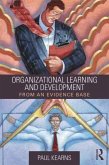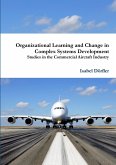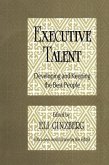Erdener Kaynak, Robert M Fulmer, J Bernard Keys
Executive Development and Organizational Learning for Global Business
Erdener Kaynak, Robert M Fulmer, J Bernard Keys
Executive Development and Organizational Learning for Global Business
- Broschiertes Buch
- Merkliste
- Auf die Merkliste
- Bewerten Bewerten
- Teilen
- Produkt teilen
- Produkterinnerung
- Produkterinnerung
Considered a must-have handbook for development managers, Executive Development and Organizational Learning for Global Business gives you a unique perspective on the major challenges you'll face when setting up your executive education program. Anyone creating a comprehensive game plan for a large global organization will want to be familiar with the informative practices in this book.
Andere Kunden interessierten sich auch für
![Organizational Learning and Development Organizational Learning and Development]() Paul KearnsOrganizational Learning and Development59,99 €
Paul KearnsOrganizational Learning and Development59,99 €![The Strategic Use of Stories in Organizational Communication and Learning The Strategic Use of Stories in Organizational Communication and Learning]() Terrence L. GargiuloThe Strategic Use of Stories in Organizational Communication and Learning59,99 €
Terrence L. GargiuloThe Strategic Use of Stories in Organizational Communication and Learning59,99 €![Organizational Learning and Change in Complex Systems Development Organizational Learning and Change in Complex Systems Development]() Isabel DörflerOrganizational Learning and Change in Complex Systems Development59,99 €
Isabel DörflerOrganizational Learning and Change in Complex Systems Development59,99 €![Dark Towers Dark Towers]() David EnrichDark Towers15,99 €
David EnrichDark Towers15,99 €![Executive Talent Executive Talent]() Peter BlauExecutive Talent59,99 €
Peter BlauExecutive Talent59,99 €![learning Human Behavior Influences Business Market development learning Human Behavior Influences Business Market development]() John Loklearning Human Behavior Influences Business Market development26,99 €
John Loklearning Human Behavior Influences Business Market development26,99 €![Learning Organizational Behavioral Economy Learning Organizational Behavioral Economy]() John LokLearning Organizational Behavioral Economy21,99 €
John LokLearning Organizational Behavioral Economy21,99 €-
-
-
Considered a must-have handbook for development managers, Executive Development and Organizational Learning for Global Business gives you a unique perspective on the major challenges you'll face when setting up your executive education program. Anyone creating a comprehensive game plan for a large global organization will want to be familiar with the informative practices in this book.
Produktdetails
- Produktdetails
- Verlag: Routledge
- Seitenzahl: 292
- Erscheinungstermin: 31. März 1998
- Englisch
- Abmessung: 234mm x 156mm x 16mm
- Gewicht: 447g
- ISBN-13: 9780789004796
- ISBN-10: 0789004798
- Artikelnr.: 21976863
- Herstellerkennzeichnung
- Libri GmbH
- Europaallee 1
- 36244 Bad Hersfeld
- gpsr@libri.de
- Verlag: Routledge
- Seitenzahl: 292
- Erscheinungstermin: 31. März 1998
- Englisch
- Abmessung: 234mm x 156mm x 16mm
- Gewicht: 447g
- ISBN-13: 9780789004796
- ISBN-10: 0789004798
- Artikelnr.: 21976863
- Herstellerkennzeichnung
- Libri GmbH
- Europaallee 1
- 36244 Bad Hersfeld
- gpsr@libri.de
Kaynak, Erdener; Fulmer, Robert M; Keys, J Bernard
Contents
About the Editors
* Contributors
* Introduction: Seven Imperatives for Executive Education and
Organizational Learning in the Global World
* Think and Act Globally
* Become an Equidistant Global Learning Organization
* Focus on the Global System, Not Its Parts
* Develop Global Leadership Skills
* Empower Teams to Create a Global Future
* Make Learning a Core Competence for Your global Organization
* Regularly Reinvent Yourself and the Global Organization
* PART I: GLOBALIZATION AND LEARNING
* Chapter 1. Anticipatory Learning for Global Organization
* The Organizational Learning Imperative
* All Learning Is Not Equal
* The Organizational Learning Matrix
* Forecasting versus Creating the Future
* From the Forecasted Future to the Invented Future
* Summary and Conclusion
* Chapter 2. Do Cultural Differences Make a Difference? Contextual
Factors Affecting Cross-cultural Relationship Success
* In Search of Cultural Differences
* The Foreign Acquisitions Study
* Culture versus Context as an Explanatory Factor
* Contextual Factors as Key Determinants of Cross-Cultural Relationship
Success
* The Negative Side of Cross-Cultural Interaction: Threat and Prejudice
* The Attribution of Organizational Problems to National Culture
* Conclusion
* Chapter 3. Managing Globally Competent People
* Transnationally Competent Managers
* The Globalization of Business: Strategy, Structure, and Managerial
Skills
* Transnational Human Resource Systems
* Today's Firms: How Transnational?
* Illusions and Recommendations
* Chapter 4. Creating a High-Performance International Team
* Establishing the Context of the Growing Number of International Teams
* Creating and Managing an International Team
* Managing the Geographical Distances Managing Globally Competent
People
* Creating a High Performance International Team (Sue Canney Davison)
* Establishing the Context of the Growing Number of International Teams
* Creating and Managing an international Team
* Managing the Geographical Distances
* Working Within the Team
* PART II: DEVELOPING THE GLOBAL EXECUTIVE
* Chapter 5. Selecting Training Methodology for International Managers
* A Model for Managerial Training for International Assignments
* A Theoretical Base for Training Methodology
* Management Development Methods
* Developing Cognitive Competencies
* Developing Behavioral Competencies with Experiential Methods
* Developing Performance Competencies
* Summary and Case Application of the Training Model
* Recommendations for future Research
* Chapter 6. Creating Scenarios and Cases for Global Anticipatory
Learning
* Review of Anticipatory Learning Program Issues
* Scenario Planning
* Cases
* Conclusion
* Chapter 7. A Culture-General Assimilator: Preparation for Various
Types of Sojourns
* Introduction
* Rationale for Materials Development
* The Culture-Assimilator Format
* Learning the Ropes
* The Themes Around Which the One Hundred Incidents Were Developed
* Uses for Culture-General Assimilator
* Conclusion
* Chapter 8. Action Learning: Executive Development of Choice for the
1990s
* What Is Action Learning?
* Traditional Approaches to Action Learning
* Unique Action Learning Adaptations
* Summary
* Chapter 9. Case Studies of International Management Development
* Needs Analysis for International Training
* Program Design and Development
* Training for Trainers
* Cultural Awareness
* International Negotiation
* Consulting in a Multicultural Environment
* Communication in a International Context
* Expatriate Preparation
* Managing Internationally
* An Application by ICM Management Training in Russia: Traps and Gaps
* PART III: DEVELOPING THE LEARNING ORGANIZATION
* Chapter 10. Systems Dynamics and Anticipatory Learning
* Examples of Microworlds
*
About the Editors
* Contributors
* Introduction: Seven Imperatives for Executive Education and
Organizational Learning in the Global World
* Think and Act Globally
* Become an Equidistant Global Learning Organization
* Focus on the Global System, Not Its Parts
* Develop Global Leadership Skills
* Empower Teams to Create a Global Future
* Make Learning a Core Competence for Your global Organization
* Regularly Reinvent Yourself and the Global Organization
* PART I: GLOBALIZATION AND LEARNING
* Chapter 1. Anticipatory Learning for Global Organization
* The Organizational Learning Imperative
* All Learning Is Not Equal
* The Organizational Learning Matrix
* Forecasting versus Creating the Future
* From the Forecasted Future to the Invented Future
* Summary and Conclusion
* Chapter 2. Do Cultural Differences Make a Difference? Contextual
Factors Affecting Cross-cultural Relationship Success
* In Search of Cultural Differences
* The Foreign Acquisitions Study
* Culture versus Context as an Explanatory Factor
* Contextual Factors as Key Determinants of Cross-Cultural Relationship
Success
* The Negative Side of Cross-Cultural Interaction: Threat and Prejudice
* The Attribution of Organizational Problems to National Culture
* Conclusion
* Chapter 3. Managing Globally Competent People
* Transnationally Competent Managers
* The Globalization of Business: Strategy, Structure, and Managerial
Skills
* Transnational Human Resource Systems
* Today's Firms: How Transnational?
* Illusions and Recommendations
* Chapter 4. Creating a High-Performance International Team
* Establishing the Context of the Growing Number of International Teams
* Creating and Managing an International Team
* Managing the Geographical Distances Managing Globally Competent
People
* Creating a High Performance International Team (Sue Canney Davison)
* Establishing the Context of the Growing Number of International Teams
* Creating and Managing an international Team
* Managing the Geographical Distances
* Working Within the Team
* PART II: DEVELOPING THE GLOBAL EXECUTIVE
* Chapter 5. Selecting Training Methodology for International Managers
* A Model for Managerial Training for International Assignments
* A Theoretical Base for Training Methodology
* Management Development Methods
* Developing Cognitive Competencies
* Developing Behavioral Competencies with Experiential Methods
* Developing Performance Competencies
* Summary and Case Application of the Training Model
* Recommendations for future Research
* Chapter 6. Creating Scenarios and Cases for Global Anticipatory
Learning
* Review of Anticipatory Learning Program Issues
* Scenario Planning
* Cases
* Conclusion
* Chapter 7. A Culture-General Assimilator: Preparation for Various
Types of Sojourns
* Introduction
* Rationale for Materials Development
* The Culture-Assimilator Format
* Learning the Ropes
* The Themes Around Which the One Hundred Incidents Were Developed
* Uses for Culture-General Assimilator
* Conclusion
* Chapter 8. Action Learning: Executive Development of Choice for the
1990s
* What Is Action Learning?
* Traditional Approaches to Action Learning
* Unique Action Learning Adaptations
* Summary
* Chapter 9. Case Studies of International Management Development
* Needs Analysis for International Training
* Program Design and Development
* Training for Trainers
* Cultural Awareness
* International Negotiation
* Consulting in a Multicultural Environment
* Communication in a International Context
* Expatriate Preparation
* Managing Internationally
* An Application by ICM Management Training in Russia: Traps and Gaps
* PART III: DEVELOPING THE LEARNING ORGANIZATION
* Chapter 10. Systems Dynamics and Anticipatory Learning
* Examples of Microworlds
*
Contents
About the Editors
* Contributors
* Introduction: Seven Imperatives for Executive Education and
Organizational Learning in the Global World
* Think and Act Globally
* Become an Equidistant Global Learning Organization
* Focus on the Global System, Not Its Parts
* Develop Global Leadership Skills
* Empower Teams to Create a Global Future
* Make Learning a Core Competence for Your global Organization
* Regularly Reinvent Yourself and the Global Organization
* PART I: GLOBALIZATION AND LEARNING
* Chapter 1. Anticipatory Learning for Global Organization
* The Organizational Learning Imperative
* All Learning Is Not Equal
* The Organizational Learning Matrix
* Forecasting versus Creating the Future
* From the Forecasted Future to the Invented Future
* Summary and Conclusion
* Chapter 2. Do Cultural Differences Make a Difference? Contextual
Factors Affecting Cross-cultural Relationship Success
* In Search of Cultural Differences
* The Foreign Acquisitions Study
* Culture versus Context as an Explanatory Factor
* Contextual Factors as Key Determinants of Cross-Cultural Relationship
Success
* The Negative Side of Cross-Cultural Interaction: Threat and Prejudice
* The Attribution of Organizational Problems to National Culture
* Conclusion
* Chapter 3. Managing Globally Competent People
* Transnationally Competent Managers
* The Globalization of Business: Strategy, Structure, and Managerial
Skills
* Transnational Human Resource Systems
* Today's Firms: How Transnational?
* Illusions and Recommendations
* Chapter 4. Creating a High-Performance International Team
* Establishing the Context of the Growing Number of International Teams
* Creating and Managing an International Team
* Managing the Geographical Distances Managing Globally Competent
People
* Creating a High Performance International Team (Sue Canney Davison)
* Establishing the Context of the Growing Number of International Teams
* Creating and Managing an international Team
* Managing the Geographical Distances
* Working Within the Team
* PART II: DEVELOPING THE GLOBAL EXECUTIVE
* Chapter 5. Selecting Training Methodology for International Managers
* A Model for Managerial Training for International Assignments
* A Theoretical Base for Training Methodology
* Management Development Methods
* Developing Cognitive Competencies
* Developing Behavioral Competencies with Experiential Methods
* Developing Performance Competencies
* Summary and Case Application of the Training Model
* Recommendations for future Research
* Chapter 6. Creating Scenarios and Cases for Global Anticipatory
Learning
* Review of Anticipatory Learning Program Issues
* Scenario Planning
* Cases
* Conclusion
* Chapter 7. A Culture-General Assimilator: Preparation for Various
Types of Sojourns
* Introduction
* Rationale for Materials Development
* The Culture-Assimilator Format
* Learning the Ropes
* The Themes Around Which the One Hundred Incidents Were Developed
* Uses for Culture-General Assimilator
* Conclusion
* Chapter 8. Action Learning: Executive Development of Choice for the
1990s
* What Is Action Learning?
* Traditional Approaches to Action Learning
* Unique Action Learning Adaptations
* Summary
* Chapter 9. Case Studies of International Management Development
* Needs Analysis for International Training
* Program Design and Development
* Training for Trainers
* Cultural Awareness
* International Negotiation
* Consulting in a Multicultural Environment
* Communication in a International Context
* Expatriate Preparation
* Managing Internationally
* An Application by ICM Management Training in Russia: Traps and Gaps
* PART III: DEVELOPING THE LEARNING ORGANIZATION
* Chapter 10. Systems Dynamics and Anticipatory Learning
* Examples of Microworlds
*
About the Editors
* Contributors
* Introduction: Seven Imperatives for Executive Education and
Organizational Learning in the Global World
* Think and Act Globally
* Become an Equidistant Global Learning Organization
* Focus on the Global System, Not Its Parts
* Develop Global Leadership Skills
* Empower Teams to Create a Global Future
* Make Learning a Core Competence for Your global Organization
* Regularly Reinvent Yourself and the Global Organization
* PART I: GLOBALIZATION AND LEARNING
* Chapter 1. Anticipatory Learning for Global Organization
* The Organizational Learning Imperative
* All Learning Is Not Equal
* The Organizational Learning Matrix
* Forecasting versus Creating the Future
* From the Forecasted Future to the Invented Future
* Summary and Conclusion
* Chapter 2. Do Cultural Differences Make a Difference? Contextual
Factors Affecting Cross-cultural Relationship Success
* In Search of Cultural Differences
* The Foreign Acquisitions Study
* Culture versus Context as an Explanatory Factor
* Contextual Factors as Key Determinants of Cross-Cultural Relationship
Success
* The Negative Side of Cross-Cultural Interaction: Threat and Prejudice
* The Attribution of Organizational Problems to National Culture
* Conclusion
* Chapter 3. Managing Globally Competent People
* Transnationally Competent Managers
* The Globalization of Business: Strategy, Structure, and Managerial
Skills
* Transnational Human Resource Systems
* Today's Firms: How Transnational?
* Illusions and Recommendations
* Chapter 4. Creating a High-Performance International Team
* Establishing the Context of the Growing Number of International Teams
* Creating and Managing an International Team
* Managing the Geographical Distances Managing Globally Competent
People
* Creating a High Performance International Team (Sue Canney Davison)
* Establishing the Context of the Growing Number of International Teams
* Creating and Managing an international Team
* Managing the Geographical Distances
* Working Within the Team
* PART II: DEVELOPING THE GLOBAL EXECUTIVE
* Chapter 5. Selecting Training Methodology for International Managers
* A Model for Managerial Training for International Assignments
* A Theoretical Base for Training Methodology
* Management Development Methods
* Developing Cognitive Competencies
* Developing Behavioral Competencies with Experiential Methods
* Developing Performance Competencies
* Summary and Case Application of the Training Model
* Recommendations for future Research
* Chapter 6. Creating Scenarios and Cases for Global Anticipatory
Learning
* Review of Anticipatory Learning Program Issues
* Scenario Planning
* Cases
* Conclusion
* Chapter 7. A Culture-General Assimilator: Preparation for Various
Types of Sojourns
* Introduction
* Rationale for Materials Development
* The Culture-Assimilator Format
* Learning the Ropes
* The Themes Around Which the One Hundred Incidents Were Developed
* Uses for Culture-General Assimilator
* Conclusion
* Chapter 8. Action Learning: Executive Development of Choice for the
1990s
* What Is Action Learning?
* Traditional Approaches to Action Learning
* Unique Action Learning Adaptations
* Summary
* Chapter 9. Case Studies of International Management Development
* Needs Analysis for International Training
* Program Design and Development
* Training for Trainers
* Cultural Awareness
* International Negotiation
* Consulting in a Multicultural Environment
* Communication in a International Context
* Expatriate Preparation
* Managing Internationally
* An Application by ICM Management Training in Russia: Traps and Gaps
* PART III: DEVELOPING THE LEARNING ORGANIZATION
* Chapter 10. Systems Dynamics and Anticipatory Learning
* Examples of Microworlds
*








